Unit 5 Wild Animals-Grammar课件2022-2023学年牛津译林版八年级英语上册(共40张PPT)
文档属性
| 名称 | Unit 5 Wild Animals-Grammar课件2022-2023学年牛津译林版八年级英语上册(共40张PPT) |
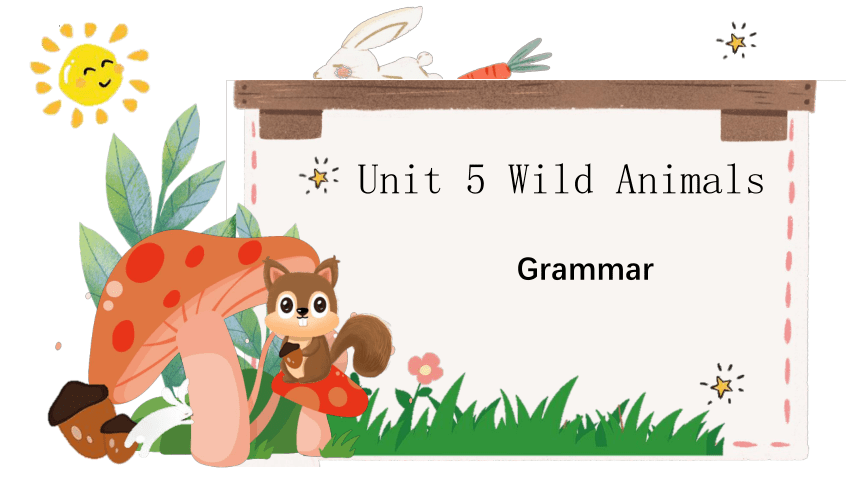
|
|
| 格式 | zip | ||
| 文件大小 | 21.9MB | ||
| 资源类型 | 教案 | ||
| 版本资源 | 牛津译林版 | ||
| 科目 | 英语 | ||
| 更新时间 | 2022-08-11 00:00:00 | ||
图片预览

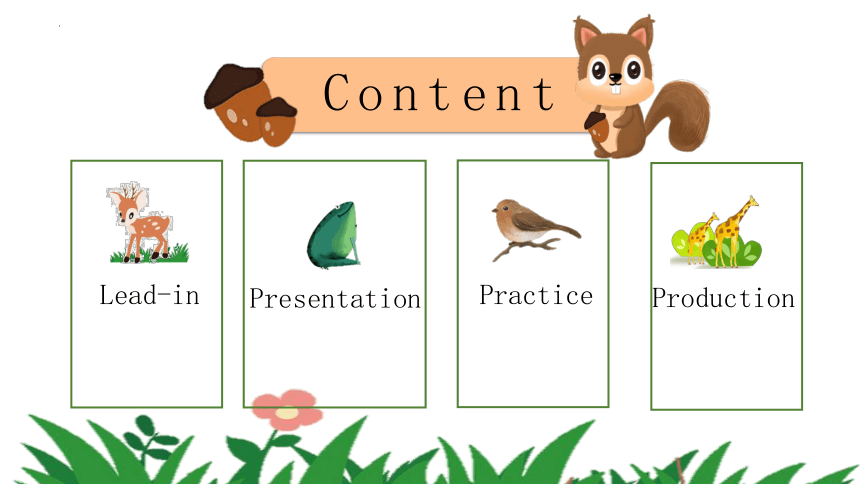
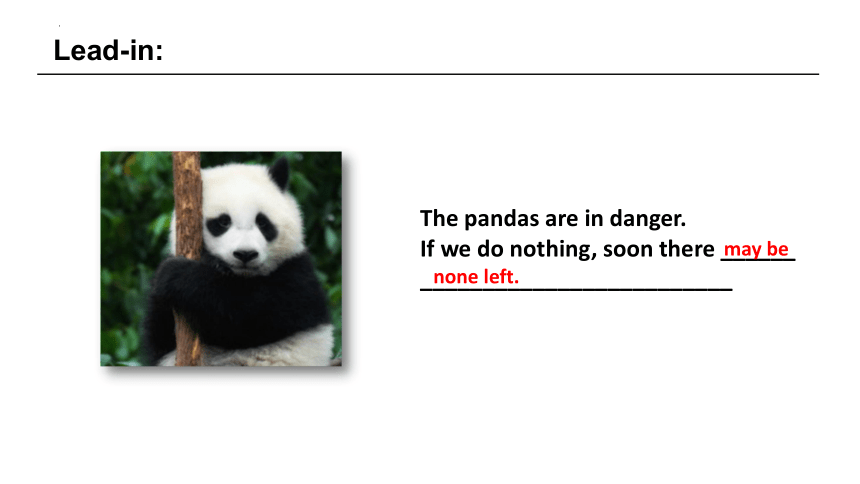
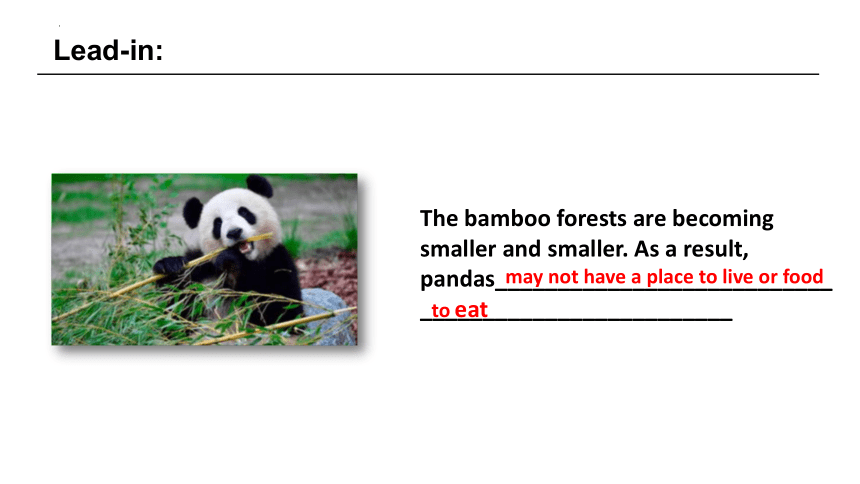
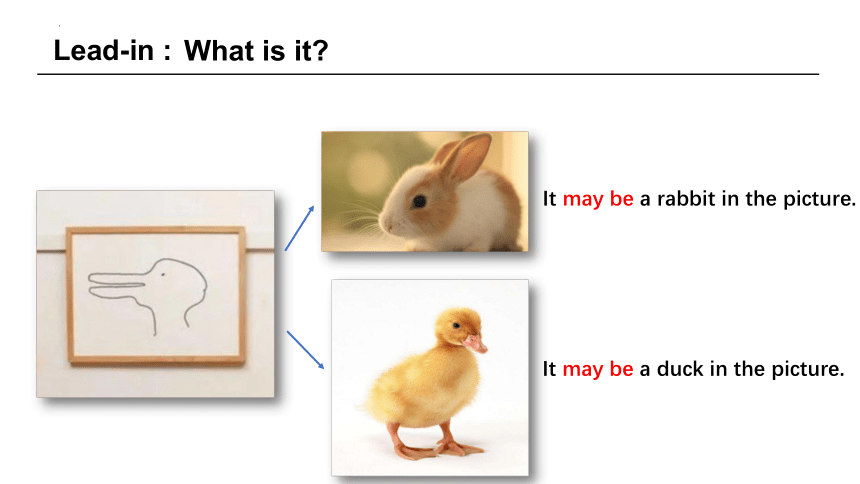
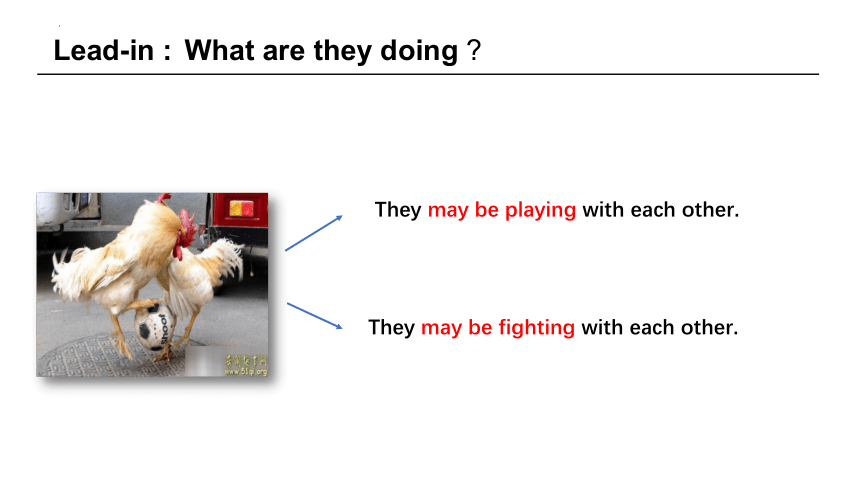
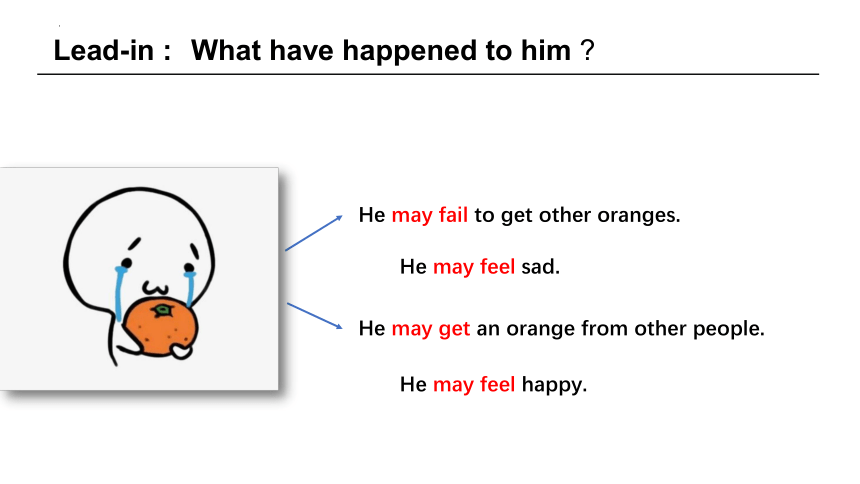
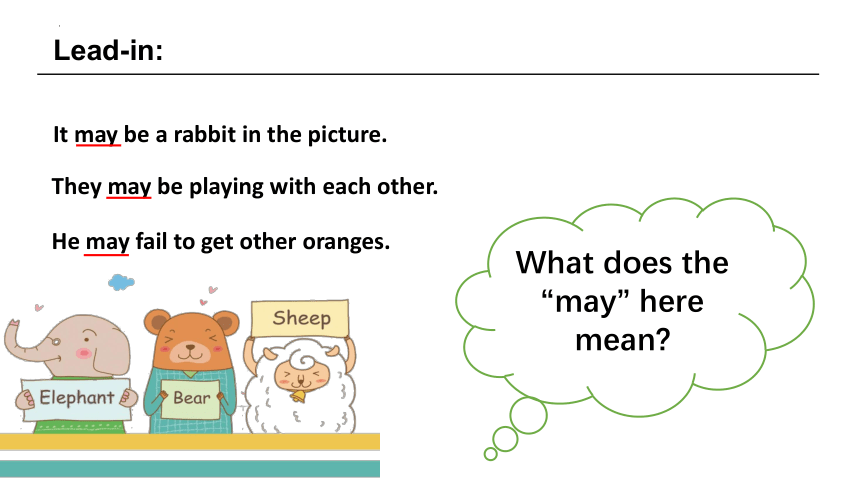

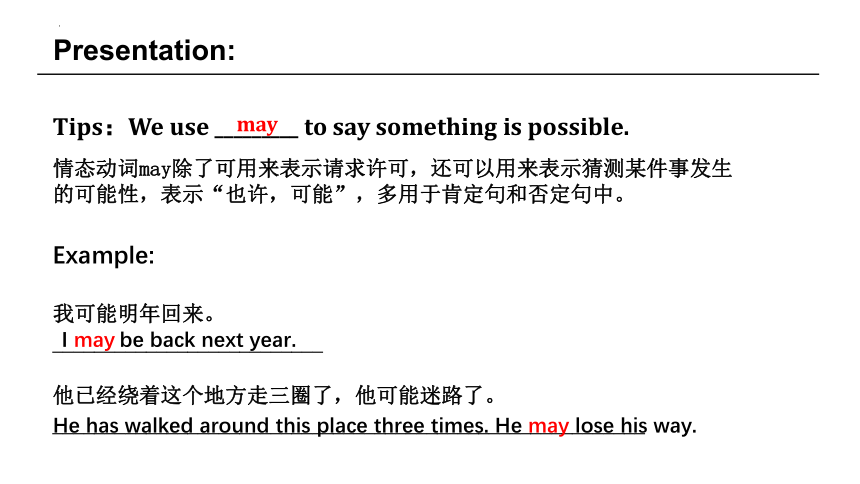
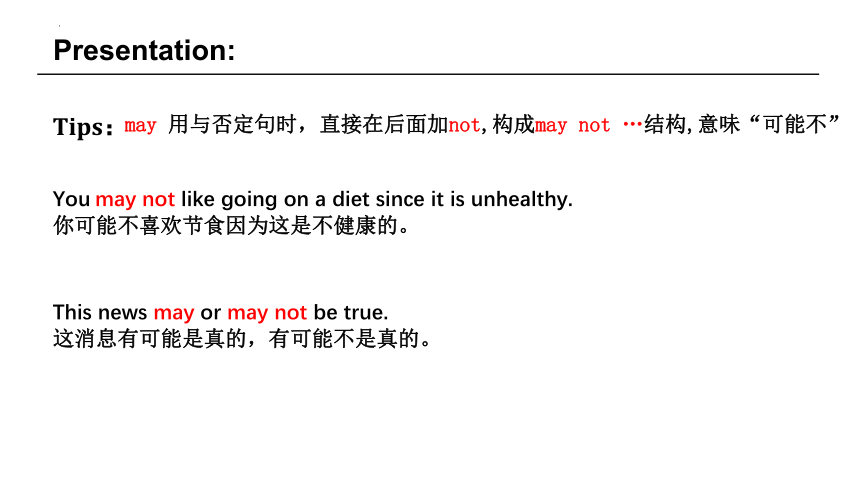
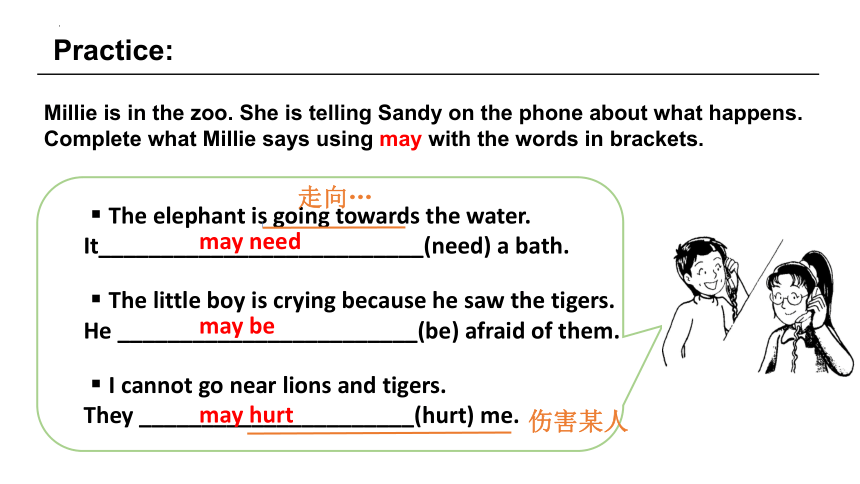
文档简介
(共40张PPT)
Unit 5 Wild Animals
Grammar
Lead-in
Practice
Production
Content
Presentation
The pandas are in danger.
If we do nothing, soon there ______ _________________________
may be
none left.
Lead-in:
Lead-in:
The bamboo forests are becoming smaller and smaller. As a result, pandas___________________________ _________________________
may not have a place to live or food
to eat
Lead-in :
What is it
It may be a duck in the picture.
It may be a rabbit in the picture.
Lead-in :
What are they doing
They may be fighting with each other.
They may be playing with each other.
Lead-in :
What have happened to him
He may get an orange from other people.
He may fail to get other oranges.
He may feel sad.
He may feel happy.
Lead-in:
What does the “may” here mean
It may be a rabbit in the picture.
They may be playing with each other.
He may fail to get other oranges.
Presentation:
Tips:We use _________ to say something is possible.
may
may be sth
may be doing sth …
may do sth
可能是…
可能正在做某事
可能做某事
情态动词may除了可用来表示请求许可,还可以用来表示猜测某件事发生的可能性,表示“也许,可能”,多用于肯定句和否定句中。
They may be playing with each other.
He may fail to get other oranges.
It may be a rabbit in the picture.
Three forms
Presentation:
Tips:We use _________ to say something is possible.
may
情态动词may除了可用来表示请求许可,还可以用来表示猜测某件事发生的可能性,表示“也许,可能”,多用于肯定句和否定句中。
Example:
我可能明年回来。
__________________________
他已经绕着这个地方走三圈了,他可能迷路了。
_________________________________________________________
I may be back next year.
He has walked around this place three times. He may lose his way.
Presentation:
Tips:
may 用与否定句时,直接在后面加not,构成may not …结构,意味“可能不”
You may not like going on a diet since it is unhealthy.
你可能不喜欢节食因为这是不健康的。
This news may or may not be true.
这消息有可能是真的,有可能不是真的。
Practice:
Millie is in the zoo. She is telling Sandy on the phone about what plete what Millie says using may with the words in brackets.
The elephant is going towards the water.
It__________________________(need) a bath.
The little boy is crying because he saw the tigers.
He ________________________(be) afraid of them.
I cannot go near lions and tigers.
They ______________________(hurt) me.
may need
may hurt
may be
走向…
伤害某人
Practice:
Millie is in the zoo. She is telling Sandy on the phone about what plete what Millie says using may with the words in brackets.
The baby panda is not drinking its mum’s milk.
It __________________________(not be) hungry.
The monkeys are jumping around.
They ________________________(be playing) with each other.
The horse is standing with its eyes closed.
It __________________________(be sleeping) .
may not be
may be playing
may be sleeping
伴随状语,表示一种状态
Practice:
(完成)课课练P86 第二大项单项选择
Other Model verbs:
①must
②can
③could
④*might
表推测,一定 。
e. g. The soft toy must belong to Lucy. She is the only child at the picnic.
表示可能性语气由上到下依次减弱。即must>can>could>may>might.
could, might并不一定是can, may的过去式,有时只是语气分别比can, may更弱。
表可能,用于否定句和疑问句中,不能用于肯定句。
can’t 表示不可能。
e. g. It can’t be David. I saw him in the classroom just now.
既可以表示过去的可能性,又可以表示现在的可能性。
e.g. She could swim.
表示可能的时候不是may的过去式
e.g. I don’t know the gift. It might be a box.
Practice:
1.By the time she was eight, Linda ________ read English and French.
A. could B. must C.need D. may
2.You ______ be able to control all the things that happened to you, but you can decide not to be reduced by them.
A. need not B.may not C.must not D.should not
4. ——The article says that one's personality depends on his animal sign.
——You _____read it for fun, but don't believe in that.
A. have to B. need C.should D. can
3.If we don't protect nature, some wilflife_____ die out in the future.
A. need B. may C.can't D. shouldn't
A
B
D
B
could表示一种能力
must表示一种可能性
may表示一种可能性
can表示一种允许
may表示一种可能性
5.——In China, many students feel stressed because of too much homework.
——Don't worry.Our government has realized this problem.I'm sure there_______be good news for them soon.
A. can B. must C.should D. need
B
Conclusion:
用法 can could
表能力 指现在的能力。 指过去的能力
表推测 ①用于否定句和疑问句中, 不能用于肯定句中。 ②can’t 表示不可能。 ①表示过去的可能性
②表示现在的可能性,此时比can 语气更弱
③用于肯定句,否定句,疑问句
表请求,允许 表示允许,与may的意思差不多 Could表示请求或提议时,比can语气更委婉,不表示过去,且只用在疑问句中,回答时用can
can
Conclusion:
用法 may Example
表推测 ①表示“可能,也许”,表示的可能性比can小 ②不用于否定句中 e.g. He has walked around this place three times. He may lose his way.
表请求,允许 表示“可以” e.g.——May I use your car, Dad
——Yes, you may./No, you mustn’t/can’t(不能用may not )
表祝愿 结构:“May+主语+动词原形” e.g. May you succeed.
may
Conclusion:
用法 must Example
表义务 ①表示“必须”。 ②否定形式是mustn’t,意为不允许,表示禁止做某事。 e.g. Children mustn’t play with the ball on the road.
表推测 表示“一定”,指非常有把握的推测,只能用于肯定句。 e.g. The soft toy must belong to Lucy. She is the only child at the picnic.
must
Task: Group work—— discussion
Think about what to prepare before going to the zoo.
Task: Group work—— discussion
Think about what to prepare before going to the zoo.
Telescope
Map
Umbrella
Task: Group work—— discussion
Think about what to prepare before going to the zoo.
Telescope
Map
Umbrella
food
water
…….
words
A1:What will you take before going to the zoo Why
A2:I may take…,because.../I may not take… , because…
Gate
Service center
Radio station
Monkey mountain
Tiger forest
canteen
Station
toilet
Gate
Service center
Station
canteen
Radio station
toilet
Tiger forest
Monkey mountain
Task: Make a dialogue
A: Where do you want to visit first
B:I want to visit___________.
A:How do you plan to go to _______.
B:It’s not far. I plan to go there __________.
A:What do you decide to do when you go to__________.
B:I decide to____________.
verbs + to-infinitives
Presentation: Using verbs + to-infinitives
At four years old,she go outside for the first time.
When she was six month old, she eat bamboo.
When she was 20 months old, she look after herself.
started to
began to
learnt to
More verbs like this
Presentation: Using verbs + to-infinitives
More verbs like this
Agree, promise(承诺),fail, forget, refuse(拒绝),hope, prepare, remember…
When she was 20 months old, she learnt to look after herself.
Presentation: Using verbs + to-infinitives
Verbs+(not) to do
动词+动词不定式
当句子中已经有谓语动词,而我们又要表达不止一个动作概念时,其余的动词可以使用非谓语形式表达,动词不定式就是动词的一种非谓语形式,其基本形式是“to+动词原形”
Example:
At four years old, she decided to go outside for the first time.
When she was six month old, she began to eat bamboo.
Presentation: Using verbs + to-infinitives
Verbs+(not) to do
The little monkey are learning________(climb) the tree.
to climb
Monkey mountain
(We see that…)
Children, remember not to climb the tree!
Presentation: Using verbs + to-infinitives
Verbs+(not) to do
The Mather wants ______(clean) her baby’s fur.
to clean
Monkey mountain
(We see that…)
Presentation: Using verbs + to-infinitives
Verbs+(not) to do
The monkey plans ______(pick) the fruit.
to pick
Monkey mountain
(We see that…)
Production: Group work
Monkey mountain
Remember ____ ___ feed animals.
Verbs+(not) to do
not
to
Production: Group work
Monkey mountain
Remember ____ ___ use the
flashlight(闪光灯) when taking photos.
Verbs+(not) to do
not
to
Production: Group work
Step 1. think by yourself
Step 2. talk to your partners
Step 3. write down on the paper
Step 4. Show the results to the class.
Other rules in the zoo?Why
Remember (not) to ...
forget to ...
Tips
Pay attention to the signs in the zoo.
Follow the rules in the zoo.
Remember not to feed the animals because they may get sick.
Don't forget to stay away from dangerous animals like tigers because they may hurt you.
Remember to turn off the flashlight while you are using a camera because it may frighten the animals.
Practice: Using verbs + to-infinitives
P62
Amy’s dad is asking Amy some questions about plete their conversation with the words in brackets.
Dad: Do you know anything special about wild animals
Amy: Yes, Dad. For example, dolphins are clever.
They can ______________(learn, work out) easy maths problems.
Dad: What do you know about bats
Amy: Bats can’t see, but they can_____________
(decide, fly) the right way with the help of their mouth and ears.
learn to work out
decide to fly
something/anything+adj
计算出
在…的帮助下
Practice: Using verbs + to-infinitives
P62
Amy’s dad is asking Amy some questions about plete their conversation with the words in brackets.
Dad: Did you know that bees never get lost
Amy: Yes. Bees always__________________
(remember, come back) the same way as they went.
Dad: What do you know about squirrels
Amy: They always _____________(begin, save) some food before winter comes.
Dad: Yes, but sometimes they forget where to find the food.
remember to come back
begin to save
迷路
返回
lose -lost-lost
和…一样
节约食物
宾语从句
Extension: Using verbs + to-infinitives
remember to do记得去做某事
remember doing记得做过某事
Example:
Tom ,remember to play basketball with us after class.(动作未发生)
汤姆,记得课后和我们一起打篮球。
I remember writing a letter to you last month.(动作已发生)
我记得上个月写了一封信给你。
Extension: Using verbs + to-infinitives
forget to do忘记去做某事
forget doing忘记做过某事
Example:
I forgot to close the window.
我忘记关窗户(没关)
I forgot closing the window.
我窗户忘了关过了(关了)
stop to do停止(现在做的事)去做另一件事
stop doing停止现在正在做的事
Example:
Let’s stop to have a rest.
让我们停下来休息一下
Stop talking. The teacher is coming.
不要说话。老师来了。
Extension: Using verbs + to-infinitives
有些动词后面不带to
1.Enjoy(doing)
Example: Kitty enjoys dancing.
2. Let (sb do)
Example: The teacher lets him read loudly.
3. Practice(doing something)
Example:You should practice speaking frequently.
4.Make(sb do)
Example: The joke makes me laugh.
5. Help(sb to do)
Example: She often helps me (to) carry water.
6.Finish(doing sth)
Example: You must finish doing your homework on time.
完成课课练一、三、四
Unit 5 Wild Animals
Grammar
Lead-in
Practice
Production
Content
Presentation
The pandas are in danger.
If we do nothing, soon there ______ _________________________
may be
none left.
Lead-in:
Lead-in:
The bamboo forests are becoming smaller and smaller. As a result, pandas___________________________ _________________________
may not have a place to live or food
to eat
Lead-in :
What is it
It may be a duck in the picture.
It may be a rabbit in the picture.
Lead-in :
What are they doing
They may be fighting with each other.
They may be playing with each other.
Lead-in :
What have happened to him
He may get an orange from other people.
He may fail to get other oranges.
He may feel sad.
He may feel happy.
Lead-in:
What does the “may” here mean
It may be a rabbit in the picture.
They may be playing with each other.
He may fail to get other oranges.
Presentation:
Tips:We use _________ to say something is possible.
may
may be sth
may be doing sth …
may do sth
可能是…
可能正在做某事
可能做某事
情态动词may除了可用来表示请求许可,还可以用来表示猜测某件事发生的可能性,表示“也许,可能”,多用于肯定句和否定句中。
They may be playing with each other.
He may fail to get other oranges.
It may be a rabbit in the picture.
Three forms
Presentation:
Tips:We use _________ to say something is possible.
may
情态动词may除了可用来表示请求许可,还可以用来表示猜测某件事发生的可能性,表示“也许,可能”,多用于肯定句和否定句中。
Example:
我可能明年回来。
__________________________
他已经绕着这个地方走三圈了,他可能迷路了。
_________________________________________________________
I may be back next year.
He has walked around this place three times. He may lose his way.
Presentation:
Tips:
may 用与否定句时,直接在后面加not,构成may not …结构,意味“可能不”
You may not like going on a diet since it is unhealthy.
你可能不喜欢节食因为这是不健康的。
This news may or may not be true.
这消息有可能是真的,有可能不是真的。
Practice:
Millie is in the zoo. She is telling Sandy on the phone about what plete what Millie says using may with the words in brackets.
The elephant is going towards the water.
It__________________________(need) a bath.
The little boy is crying because he saw the tigers.
He ________________________(be) afraid of them.
I cannot go near lions and tigers.
They ______________________(hurt) me.
may need
may hurt
may be
走向…
伤害某人
Practice:
Millie is in the zoo. She is telling Sandy on the phone about what plete what Millie says using may with the words in brackets.
The baby panda is not drinking its mum’s milk.
It __________________________(not be) hungry.
The monkeys are jumping around.
They ________________________(be playing) with each other.
The horse is standing with its eyes closed.
It __________________________(be sleeping) .
may not be
may be playing
may be sleeping
伴随状语,表示一种状态
Practice:
(完成)课课练P86 第二大项单项选择
Other Model verbs:
①must
②can
③could
④*might
表推测,一定 。
e. g. The soft toy must belong to Lucy. She is the only child at the picnic.
表示可能性语气由上到下依次减弱。即must>can>could>may>might.
could, might并不一定是can, may的过去式,有时只是语气分别比can, may更弱。
表可能,用于否定句和疑问句中,不能用于肯定句。
can’t 表示不可能。
e. g. It can’t be David. I saw him in the classroom just now.
既可以表示过去的可能性,又可以表示现在的可能性。
e.g. She could swim.
表示可能的时候不是may的过去式
e.g. I don’t know the gift. It might be a box.
Practice:
1.By the time she was eight, Linda ________ read English and French.
A. could B. must C.need D. may
2.You ______ be able to control all the things that happened to you, but you can decide not to be reduced by them.
A. need not B.may not C.must not D.should not
4. ——The article says that one's personality depends on his animal sign.
——You _____read it for fun, but don't believe in that.
A. have to B. need C.should D. can
3.If we don't protect nature, some wilflife_____ die out in the future.
A. need B. may C.can't D. shouldn't
A
B
D
B
could表示一种能力
must表示一种可能性
may表示一种可能性
can表示一种允许
may表示一种可能性
5.——In China, many students feel stressed because of too much homework.
——Don't worry.Our government has realized this problem.I'm sure there_______be good news for them soon.
A. can B. must C.should D. need
B
Conclusion:
用法 can could
表能力 指现在的能力。 指过去的能力
表推测 ①用于否定句和疑问句中, 不能用于肯定句中。 ②can’t 表示不可能。 ①表示过去的可能性
②表示现在的可能性,此时比can 语气更弱
③用于肯定句,否定句,疑问句
表请求,允许 表示允许,与may的意思差不多 Could表示请求或提议时,比can语气更委婉,不表示过去,且只用在疑问句中,回答时用can
can
Conclusion:
用法 may Example
表推测 ①表示“可能,也许”,表示的可能性比can小 ②不用于否定句中 e.g. He has walked around this place three times. He may lose his way.
表请求,允许 表示“可以” e.g.——May I use your car, Dad
——Yes, you may./No, you mustn’t/can’t(不能用may not )
表祝愿 结构:“May+主语+动词原形” e.g. May you succeed.
may
Conclusion:
用法 must Example
表义务 ①表示“必须”。 ②否定形式是mustn’t,意为不允许,表示禁止做某事。 e.g. Children mustn’t play with the ball on the road.
表推测 表示“一定”,指非常有把握的推测,只能用于肯定句。 e.g. The soft toy must belong to Lucy. She is the only child at the picnic.
must
Task: Group work—— discussion
Think about what to prepare before going to the zoo.
Task: Group work—— discussion
Think about what to prepare before going to the zoo.
Telescope
Map
Umbrella
Task: Group work—— discussion
Think about what to prepare before going to the zoo.
Telescope
Map
Umbrella
food
water
…….
words
A1:What will you take before going to the zoo Why
A2:I may take…,because.../I may not take… , because…
Gate
Service center
Radio station
Monkey mountain
Tiger forest
canteen
Station
toilet
Gate
Service center
Station
canteen
Radio station
toilet
Tiger forest
Monkey mountain
Task: Make a dialogue
A: Where do you want to visit first
B:I want to visit___________.
A:How do you plan to go to _______.
B:It’s not far. I plan to go there __________.
A:What do you decide to do when you go to__________.
B:I decide to____________.
verbs + to-infinitives
Presentation: Using verbs + to-infinitives
At four years old,she go outside for the first time.
When she was six month old, she eat bamboo.
When she was 20 months old, she look after herself.
started to
began to
learnt to
More verbs like this
Presentation: Using verbs + to-infinitives
More verbs like this
Agree, promise(承诺),fail, forget, refuse(拒绝),hope, prepare, remember…
When she was 20 months old, she learnt to look after herself.
Presentation: Using verbs + to-infinitives
Verbs+(not) to do
动词+动词不定式
当句子中已经有谓语动词,而我们又要表达不止一个动作概念时,其余的动词可以使用非谓语形式表达,动词不定式就是动词的一种非谓语形式,其基本形式是“to+动词原形”
Example:
At four years old, she decided to go outside for the first time.
When she was six month old, she began to eat bamboo.
Presentation: Using verbs + to-infinitives
Verbs+(not) to do
The little monkey are learning________(climb) the tree.
to climb
Monkey mountain
(We see that…)
Children, remember not to climb the tree!
Presentation: Using verbs + to-infinitives
Verbs+(not) to do
The Mather wants ______(clean) her baby’s fur.
to clean
Monkey mountain
(We see that…)
Presentation: Using verbs + to-infinitives
Verbs+(not) to do
The monkey plans ______(pick) the fruit.
to pick
Monkey mountain
(We see that…)
Production: Group work
Monkey mountain
Remember ____ ___ feed animals.
Verbs+(not) to do
not
to
Production: Group work
Monkey mountain
Remember ____ ___ use the
flashlight(闪光灯) when taking photos.
Verbs+(not) to do
not
to
Production: Group work
Step 1. think by yourself
Step 2. talk to your partners
Step 3. write down on the paper
Step 4. Show the results to the class.
Other rules in the zoo?Why
Remember (not) to ...
forget to ...
Tips
Pay attention to the signs in the zoo.
Follow the rules in the zoo.
Remember not to feed the animals because they may get sick.
Don't forget to stay away from dangerous animals like tigers because they may hurt you.
Remember to turn off the flashlight while you are using a camera because it may frighten the animals.
Practice: Using verbs + to-infinitives
P62
Amy’s dad is asking Amy some questions about plete their conversation with the words in brackets.
Dad: Do you know anything special about wild animals
Amy: Yes, Dad. For example, dolphins are clever.
They can ______________(learn, work out) easy maths problems.
Dad: What do you know about bats
Amy: Bats can’t see, but they can_____________
(decide, fly) the right way with the help of their mouth and ears.
learn to work out
decide to fly
something/anything+adj
计算出
在…的帮助下
Practice: Using verbs + to-infinitives
P62
Amy’s dad is asking Amy some questions about plete their conversation with the words in brackets.
Dad: Did you know that bees never get lost
Amy: Yes. Bees always__________________
(remember, come back) the same way as they went.
Dad: What do you know about squirrels
Amy: They always _____________(begin, save) some food before winter comes.
Dad: Yes, but sometimes they forget where to find the food.
remember to come back
begin to save
迷路
返回
lose -lost-lost
和…一样
节约食物
宾语从句
Extension: Using verbs + to-infinitives
remember to do记得去做某事
remember doing记得做过某事
Example:
Tom ,remember to play basketball with us after class.(动作未发生)
汤姆,记得课后和我们一起打篮球。
I remember writing a letter to you last month.(动作已发生)
我记得上个月写了一封信给你。
Extension: Using verbs + to-infinitives
forget to do忘记去做某事
forget doing忘记做过某事
Example:
I forgot to close the window.
我忘记关窗户(没关)
I forgot closing the window.
我窗户忘了关过了(关了)
stop to do停止(现在做的事)去做另一件事
stop doing停止现在正在做的事
Example:
Let’s stop to have a rest.
让我们停下来休息一下
Stop talking. The teacher is coming.
不要说话。老师来了。
Extension: Using verbs + to-infinitives
有些动词后面不带to
1.Enjoy(doing)
Example: Kitty enjoys dancing.
2. Let (sb do)
Example: The teacher lets him read loudly.
3. Practice(doing something)
Example:You should practice speaking frequently.
4.Make(sb do)
Example: The joke makes me laugh.
5. Help(sb to do)
Example: She often helps me (to) carry water.
6.Finish(doing sth)
Example: You must finish doing your homework on time.
完成课课练一、三、四
